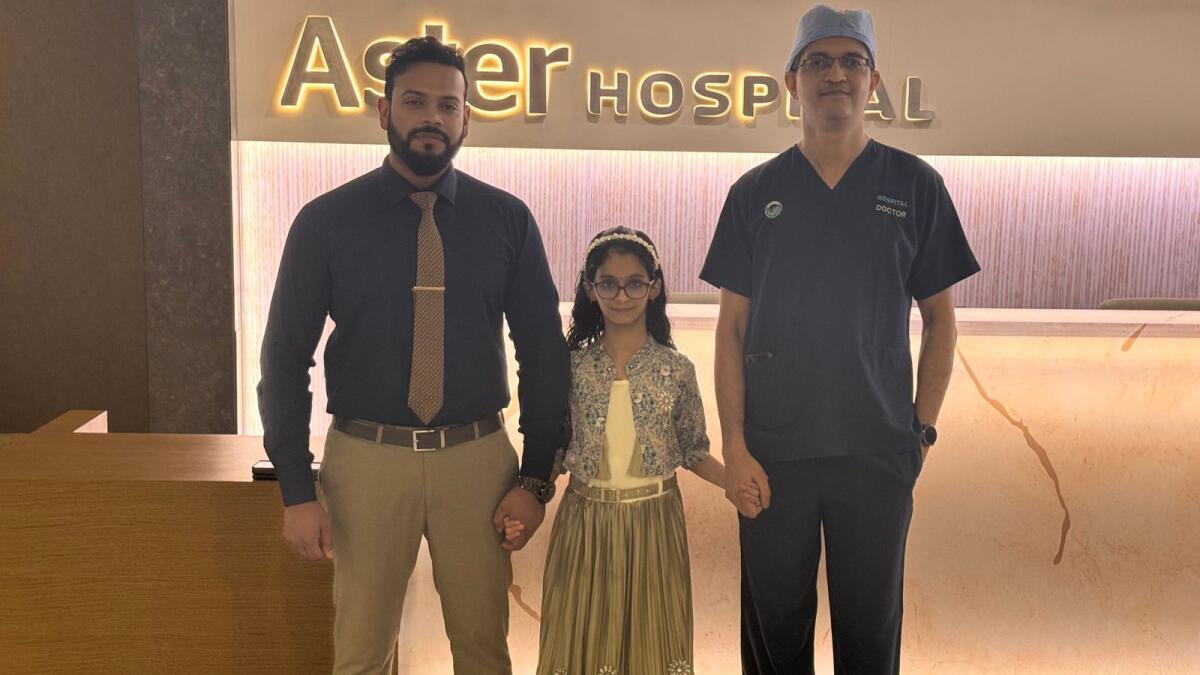Anoop, a Dubai resident, was faced with a medical emergency when his 12-year-old daughter, Devna, complained of severe stomach pain. Initially mistaken for constipation, the pain worsened to the point where she was unable to sleep. Rushed to the hospital after visiting a clinic, Devna was diagnosed with a rare and life-threatening condition called Cecal Volvulus, where the intestine is completely twisted. This condition is extremely rare, affecting only a few million people annually, with mortality rates as high as 40 percent if not treated promptly.
The medical team at Aster Hospital in Sharjah sprang into action, recognizing the urgency of Devna’s situation. Specialist Radiologist HOD Dr. Mohammed Ilyas was shocked by the results of the CT scan, sending her for an emergency surgery within 20 minutes to untwist the affected intestine and prevent further complications. The surgery, lasting over two hours, was successful due to the quick action taken by the hospital staff. Devna recovered swiftly and was able to return to school shortly after the operation, much to the relief of her family.
Dr. Mohammed believes that there was a divine intervention in Devna’s case, as her movement during the CT scan inadvertently helped to identify the exact location of the twisting, expediting the diagnosis and treatment process. The condition, while rare in itself, is even more unusual in children, posing a significant challenge for doctors in recognizing and addressing it. Dr. Sandeep stressed the importance of not ignoring severe pain in children, urging parents to seek medical attention if symptoms persist beyond 24 hours.
The successful outcome of Devna’s case serves as a reminder of the critical role of timely intervention in medical emergencies. Despite the rarity of her condition, the coordinated efforts of the hospital staff, coupled with the family’s quick action, led to a positive outcome. Both Dr. Mohammed and Dr. Sandeep expressed gratitude for the support of the radiology department and emphasized the need for parents to be vigilant in recognizing and addressing health issues in their children promptly.
Cecal Volvulus, a condition involving the twisting of the cecum, can have severe consequences if left untreated due to the obstruction it causes in the intestine. With symptoms often mimicking other gastrointestinal problems, early diagnosis is crucial to prevent further complications. Devna’s case highlights the importance of thorough medical evaluation and prompt action in similar situations, underscoring the significance of timely medical intervention in saving lives and ensuring positive outcomes for patients.
In conclusion, Anoop and Devna’s experience serves as a testament to the importance of swift medical intervention in emergency situations. The successful outcome of Devna’s case, despite the rarity and severity of her condition, underscores the critical role of healthcare providers in promptly diagnosing and treating patients. By sharing their story, Anoop hopes to raise awareness about the significance of trusting medical professionals and seeking help early, especially when dealing with uncommon medical conditions that require urgent attention. Ultimately, Devna’s recovery serves as a beacon of hope and a reminder of the importance of timely medical intervention in saving lives and ensuring positive outcomes for patients in need.











